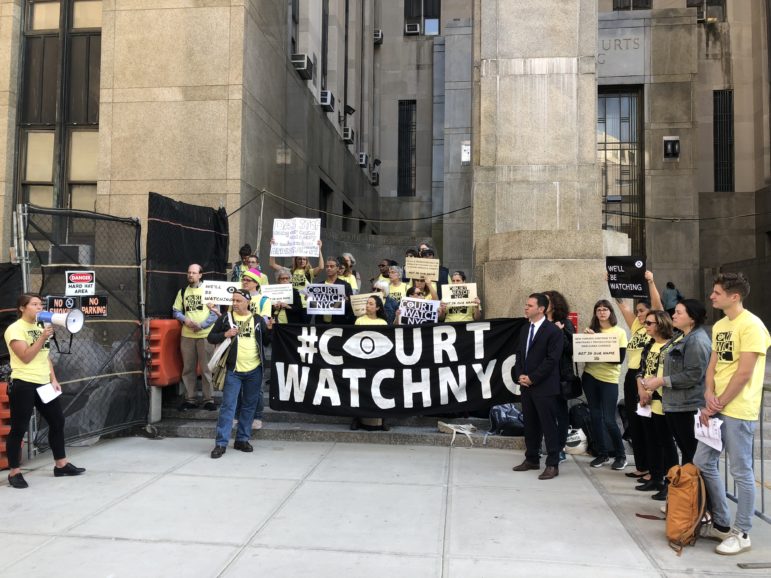
Nina Luo / Court Watch NYC
Court-watchers rallied outside of Manhattan Criminal Court on Thursday to call attention to a report arguing that despite new policies for marijuana prosecution in Manhattan and Brooklyn, the system is still racist.
Three months after a new policy to quell marijuana prosecutions by the Manhattan DA took effect, the DA’s office is touting its success but advocates are arguing that loopholes mean it has unequal impact across racial demographics.
A report released on Thursday by Court Watch NYC, a partnership of legal service nonprofits dedicated to literally watching the activity of criminal court, says that Manhattan DA Cyrus Vance’s policy and a similar one implemented by the Brooklyn DA Eric Gonzalez are being applied unequally. The report documents four cases since the policy took effect on August 1st when court watchers observed those offices prosecuting for marijuana possession and says that prosecutors treated a Black defendant differently.
According statistics from the Manhattan DA’s office, it is actually prosecuting not three but rather 22 new cases since August 1. But marijuana prosecutions are down 94 percent over this same time period.
The 22 cases the DA is prosecuting fall under exceptions for sellers and defendants the office deems a threat to public safety, which were built into the August 1 policy. The DA’s report says that since August 1st it dismissed or declined to prosecute 145 (86.3 percent) of all individuals arrested on marijuana possession or sale charges. It prosecuted 17 individuals (10 percent of all arrests) on the grounds that the individual “posed a public safety threat,” and five individuals (2.9 percent) for charges related to selling marijuana.
Both the DA’s report and the Court Watch report highlight that despite new policies, marijuana charges continue to affect Black and Latino people more. Individuals with prior criminal history and individuals who don’t have identification (a category in which Black, Latino and poor individuals are severely over-represented) are now virtually the only individuals who will face arrest for marijuana use or possession.
“[DA Vance] ran on a platform saying all these old policies are so racist. You admitted that they were subject to racist policies before, but you’re still going to prosecute them based on these prior things. How does that make you any better than the last guy?” said Amanda Ferrell, a court-watcher.
Both reports also suggest that potential differences between the Manhattan DA’s decline-to-prosecute policy and the NYPD’s new marijuana arrest policy mean that many individuals are now being arrested by the NYPD only to have their charges dropped.
Shortly after Vance’s policy took effect on August 1, the NYPD changed its own policy, saying that it will now only arrest people for marijuana possession or smoking if they have been arrested in connection with a violent crime in the last three years, are on probation or parole, have an open arrest warrant, don’t have identification or are deemed an immediate public safety risk. The difference between the number of cases prosecuted and the number of cases arraigned and screened since September 1 could indicate the DA and NYPD officers are not using the same standards.
For one, it is unclear how the DA’s standard of individuals that “pose a public safety threat” is being applied and whether it is prosecuting for cases involving individuals with a violent history or just those who were arrested for smoking marijuana in a vehicle.
Despite the cries of ‘not enough!’ there have been significant shifts on marijuana cases in recent months. Vance has also moved to vacate nearly all open marijuana cases that were charged before his office’s policy came into effect. The DA dismissed over 3,000 cases in September.
But advocates highlighted the fact that though the DA’s office has shifted significantly on marijuana, it is still imposing harsh penalties such as high bail and on New Yorkers for other types of drug use and those penalties also affect Black, Latino and poor people disproportionately.
“The War on Drugs rages on at the hands of our Brooklyn and Manhattan DAs,” said Nora Rawn, a court watcher, at a rally in front of criminal court on Thursday, noting, “Black and Latinx people make up the majority of drug-case arrests and prosecutions.”








